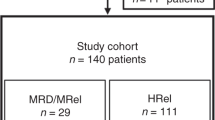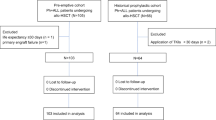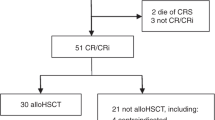Abstract
The introduction of the tyrosine kinase inhibitors (TKI) into the treatment of patients with Ph or BCR-ABL1-positive acute lymphoblastic leukemia has revolutionized the treatment of this poor prognosis acute leukemia. The combination of TKI with chemotherapy has improved response rates and allowed more patients to proceed to allogeneic hematopoietic cell transplant (alloHCT). Older patients have excellent responses to TKI and corticosteroids or in combination with minimal chemotherapy. This raises the question as to whether patients require full-intensity chemotherapy with TKI to achieve molecular remissions. The pediatricians have proposed that cure is achievable without alloHCT in children. These results have suggested that many patients may not require traditional chemotherapy in addition to TKI to achieve remission, and that patients who achieve a negative minimal residual disease state may not require alloHCT. The data in support of these questions is presented here and a suggested future clinical trial design based on these data is proposed.
This is a preview of subscription content, access via your institution
Access options
Subscribe to this journal
Receive 12 print issues and online access
$259.00 per year
only $21.58 per issue
Buy this article
- Purchase on Springer Link
- Instant access to full article PDF
Prices may be subject to local taxes which are calculated during checkout


Similar content being viewed by others
References
Fielding AK . Treatment of Philadelphia chromosome-positive acute lymphoblastic leukemia in adults: a broader range of options, improved outcomes, and more therapeutic dilemmas. Am Soc Clin Oncol Educ Book 2015; 35: e352–e359.
Secker-Walker LM, Craig JM, Hawkins JM, Hoffbrand AV . Philadelphia positive acute lymphoblastic leukemia in adults: age distribution, BCR breakpoint and prognostic significance. Leukemia 1991; 5: 196–199.
Burmeister T, Schwartz S, Bartram CR, Gokbuget N, Hoelzer D, Thiel E . Patients' age and BCR-ABL frequency in adult B-precursor ALL: a retrospective analysis from the GMALL study group. Blood 2008; 112: 918–919.
Moorman AV, Chilton L, Wilkinson J, Ensor HM, Bown N, Proctor SJ . A population-based cytogenetic study of adults with acute lymphoblastic leukemia. Blood 2010; 115: 206–214.
Dombret H, Gabert J, Boiron JM, Rigal-Huguet F, Blaise D, Thomas X et al. Outcome of treatment in adults with Philadelphia chromosome-positive acute lymphoblastic leukemia—results of the prospective multicenter LALA-94 trial. Blood 2002; 100: 2357–2366.
Fielding AK, Rowe JM, Richards SM, Buck G, Moorman AV, Durrant IJ et al. Prospective outcome data on 267 unselected adult patients with Philadelphia chromosome-positive acute lymphoblastic leukemia confirms superiority of allogeneic transplantation over chemotherapy in the pre-imatinib era: results from the International ALL Trial MRC UKALLXII/ECOG2993. Blood 2009; 113: 4489–4496.
Thomas DA, Faderl S, Cortes J, O'Brien S, Giles FJ, Kornblau SM et al. Treatment of Philadelphia chromosome-positive acute lymphocytic leukemia with hyper-CVAD and imatinib mesylate. Blood 2004; 103: 4396–4407.
Daver N, Thomas D, Ravandi F, Cortes J, Garris R, Jabbour E et al. Final report of a phase II study of imatinib mesylate with hyper-CVAD for the front-line treatment of adult patients with Philadelphia chromosome-positive acute lymphoblastic leukemia. Haematologica 2015; 100: 653–661.
Wassmann B, Pfeifer H, Goekbuget N, Beelen DW, Beck J, Stelljes M et al. Alternating versus concurrent schedules of imatinib and chemotherapy as front-line therapy for Philadelphia-positive acute lymphoblastic leukemia (Ph+ ALL). Blood 2006; 108: 1469–1477.
Yanada M, Takeuchi J, Sugiura I, Akiyama H, Usui N, Yagasaki F et al. High complete remission rate and promising outcome by combination of imatinib and chemotherapy for newly diagnosed BCR-ABL-positive acute lymphoblastic leukemia: a phase II study by the Japan Adult Leukemia Study Group. J Clin Oncol 2006; 24: 460–466.
Bassan R, Rossi G, Pogliani EM, Di Bona E, Angelucci E, Cavattoni I et al. Chemotherapy-phased imatinib pulses improve long-term outcome of adult patients with Philadelphia chromosome-positive acute lymphoblastic leukemia: Northern Italy Leukemia Group protocol 09/00. J Clin Oncol 2010; 28: 3644–3652.
Fielding AK, Rowe JM, Buck G, Foroni L, Gerrard G, Litzow MR et al. UKALLXII/ECOG2993: addition of imatinib to a standard treatment regimen enhances long-term outcomes in Philadelphia positive acute lymphoblastic leukemia. Blood 2014; 123: 843–850.
Soverini S, Gnani A, Colarossi S, Castagnetti F, Abruzzese E, Paolini S et al. Philadelphia-positive patients who already harbor imatinib-resistant Bcr-Abl kinase domain mutations have a higher likelihood of developing additional mutations associated with resistance to second- or third-line tyrosine kinase inhibitors. Blood 2009; 114: 2168–2171.
Ravandi F, O'Brien SM, Cortes JE, Thomas DM, Garris R, Faderl S et al. Long-term follow-up of a phase 2 study of chemotherapy plus dasatinib for the initial treatment of patients with Philadelphia chromosome-positive acute lymphoblastic leukemia. Cancer 2015; 121: 4158–4164.
Jabbour E, Kantarjian H, Ravandi F, Thomas D, Huang X, Faderl S et al. Combination of hyper-CVAD with ponatinib as first-line therapy for patients with Philadelphia chromosome-positive acute lymphoblastic leukaemia: a single-centre, phase 2 study. Lancet Oncol 2015; 16: 1547–1555.
Ravandi F, Othus M, O'Brien S, Forman SJ, Ha CS, Wong JYC et al. Multi-Center US intergroup study of intensive chemotherapy plus dasatinib followed by allogeneic stem cell transplant in patients with philadelphia chromosome positive acute lymphoblastic leukemia younger than 60. Blood 2015; 126: 796.
Kim DY, Joo YD, Lim SN, Kim SD, Lee JH, Kim DH et al. Nilotinib combined with multiagent chemotherapy for newly diagnosed Philadelphia-positive acute lymphoblastic leukemia. Blood 2015; 126: 746–756.
Couban S, Savoie L, Mourad YA, Leber B, Minden M, Turner R et al. Evidence-based guidelines for the use of tyrosine kinase inhibitors in adults with Philadelphia chromosome-positive or BCR-ABL-positive acute lymphoblastic leukemia: a Canadian consensus. Curr Oncol 2014; 21: e265–e309.
Daenen S, van der Holt B, Dekker AW, Willemze R, Rijneveld AW, Biemond BJ et al. Intensive chemotherapy to improve outcome in patients with acute lymphoblastic leukemia over the age of 40: a phase II study for efficacy and feasibility by HOVON. Leukemia 2012; 26: 1726–1729.
Sive JI, Buck G, Fielding A, Lazarus HM, Litzow MR, Luger S et al. Outcomes in older adults with acute lymphoblastic leukaemia (ALL): results from the international MRC UKALL XII/ECOG2993 trial. Br J Haematol 2012; 157: 463–471.
Vignetti M, Fazi P, Cimino G, Martinelli G, Di Raimondo F, Ferrara F et al. Imatinib plus steroids induces complete remissions and prolonged survival in elderly Philadelphia chromosome-positive patients with acute lymphoblastic leukemia without additional chemotherapy: results of the Gruppo Italiano Malattie Ematologiche dell'Adulto (GIMEMA) LAL0201-B protocol. Blood 2007; 109: 3676–3678.
Foa R, Vitale A, Vignetti M, Meloni G, Guarini A, De Propris MS et al. Dasatinib as first-line treatment for adult patients with Philadelphia chromosome-positive acute lymphoblastic leukemia. Blood 2011; 118: 6521–6528.
Chiaretti S, Vitale A, Elia L, Albino S, Piciocchi A, Fazi P et al. First results of the multicenter total therapy gimema LAL 1509 protocol for de novo adult philadelphia chromosome positive (Ph+) acute lymphoblastic leukemia (ALL) patients. Blood 2014; 124: 797–797.
Chalandon Y, Thomas X, Hayette S, Cayuela JM, Abbal C, Huguet F et al. Randomized study of reduced-intensity chemotherapy combined with imatinib in adults with Ph-positive acute lymphoblastic leukemia. Blood 2015; 125: 3711–3719.
van Dongen JJ, van der Velden VH, Bruggemann M, Orfao A . Minimal residual disease diagnostics in acute lymphoblastic leukemia: need for sensitive, fast, and standardized technologies. Blood 2015; 125: 3996–4009.
Schultz KR, Bowman WP, Aledo A, Slayton WB, Sather H, Devidas M et al. Improved early event-free survival with imatinib in Philadelphia chromosome-positive acute lymphoblastic leukemia: a children's oncology group study. J Clin Oncol 2009; 27: 5175–5181.
Schultz KR, Carroll A, Heerema NA, Bowman WP, Aledo A, Slayton WB et al. Long-term follow-up of imatinib in pediatric Philadelphia chromosome-positive acute lymphoblastic leukemia: Children's Oncology Group study AALL0031. Leukemia 2014; 28: 1467–1471.
Ravandi F, Jorgensen JL, Thomas DA, O'Brien S, Garris R, Faderl S et al. Detection of MRD may predict the outcome of patients with Philadelphia chromosome-positive ALL treated with tyrosine kinase inhibitors plus chemotherapy. Blood 2013; 122: 1214–1221.
Wetzler M, Watson D, Stock W, Koval G, Mulkey FA, Hoke EE et al. Autologous transplantation for Philadelphia chromosome-positive acute lymphoblastic leukemia achieves outcomes similar to allogeneic transplantation: results of CALGB Study 10001 (Alliance). Haematologica 2014; 99: 111–115.
Wassmann B, Pfeifer H, Stadler M, Bornhauser M, Bug G, Scheuring UJ et al. Early molecular response to posttransplantation imatinib determines outcome in MRD+ Philadelphia-positive acute lymphoblastic leukemia (Ph+ ALL). Blood 2005; 106: 458–463.
Carpenter PA, Snyder DS, Flowers ME, Sanders JE, Gooley TA, Martin PJ et al. Prophylactic administration of imatinib after hematopoietic cell transplantation for high-risk Philadelphia chromosome-positive leukemia. Blood 2007; 109: 2791–2793.
Chen H, Liu KY, Xu LP, Liu DH, Chen YH, Zhao XY et al. Administration of imatinib after allogeneic hematopoietic stem cell transplantation may improve disease-free survival for patients with Philadelphia chromosome-positive acute lymphobla stic leukemia. J Hematol Oncol 2012; 5: 29.
Pfeifer H, Wassmann B, Bethge W, Dengler J, Bornhauser M, Stadler M et al. Randomized comparison of prophylactic and minimal residual disease-triggered imatinib after allogeneic stem cell transplantation for BCR-ABL1-positive acute lymphoblastic leukemia. Leukemia 2013; 27: 1254–1262.
Caocci G, Vacca A, Ledda A, Murgia F, Piras E, Greco M et al. Prophylactic and preemptive therapy with dasatinib after hematopoietic stem cell transplantation for Philadelphia chromosome-positive acute lymphoblastic leukemia. Biol Blood Marrow Transplant 2012; 18: 652–654.
Goekbuget N, Dombret H, Bonifacio M, Reichle A, Graux C, Havelange V et al. BLAST: a confirmatory, single-arm, phase 2 study of blinatumomab, a bispecific T-cell engager (BiTE®) antibody construct, in patients with minimal residual disease B-precursor acute lymphoblastic leukemia (ALL). Blood 2014; 124: 379–379.
Topp MS, Gokbuget N, Stein AS, Zugmaier G, O'Brien S, Bargou RC et al. Safety and activity of blinatumomab for adult patients with relapsed or refractory B-precursor acute lymphoblastic leukaemia: a multicentre, single-arm, phase 2 study. Lancet Oncol 2015; 16: 57–66.
Martinelli G, Dombret H, Chevallier P, Ottmann OG, Goekbuget N, Topp MS et al. Complete molecular and hematologic response in adult patients with relapsed/refractory (R/R) Philadelphia chromosome-positive B-precursor acute lymphoblastic leukemia (ALL) following treatment with blinatumomab: results from a phase 2 single-arm, multicenter study (ALCANTARA) (Abstract 679). Blood 2015; 126: 679.
Burnett AK, Russell NH, Hills RK, Bowen D, Kell J, Knapper S et al. Arsenic trioxide and all-trans retinoic acid treatment for acute promyelocytic leukaemia in all risk groups (AML17): results of a randomised, controlled, phase 3 trial. Lancet Oncol 2015; 16: 1295–1305.
Lo-Coco F, Avvisati G, Vignetti M, Thiede C, Orlando SM, Iacobelli S et al. Retinoic acid and arsenic trioxide for acute promyelocytic leukemia. N Engl J Med 2013; 369: 111–121.
Acknowledgements
We thank Ms Denise Chase for excellent assistance in transcription and preparation of the manuscript. Amgen had no role in the design of this review or the decision to publish it.
Author information
Authors and Affiliations
Corresponding author
Ethics declarations
Competing interests
MRL has received research funding support from Amgen. AF has served on Amgen advisory boards. HML has served as a speaker for Bristol Myers Squibb and as a speaker for Amgen and on Amgen advisory boards. SML has received honoraria from Novartis and research funding from Amgen and Ariad. The remaining authors declare no conflict of interest.
Rights and permissions
About this article
Cite this article
Litzow, M., Fielding, A., Luger, S. et al. The evolving role of chemotherapy and hematopoietic cell transplants in Ph-positive acute lymphoblastic leukemia in adults. Bone Marrow Transplant 52, 1592–1598 (2017). https://doi.org/10.1038/bmt.2017.110
Received:
Revised:
Accepted:
Published:
Issue Date:
DOI: https://doi.org/10.1038/bmt.2017.110
This article is cited by
-
Allogeneic haematopoietic stem cell transplantation improves outcome of adults with relapsed/refractory Philadelphia chromosome-positive acute lymphoblastic leukemia entering remission following CD19 chimeric antigen receptor T cells
Bone Marrow Transplantation (2021)
-
Novel Therapies in the Treatment of Adult Acute Lymphoblastic Leukemia
Current Hematologic Malignancy Reports (2020)
-
Treatment and monitoring of Philadelphia chromosome-positive leukemia patients: recent advances and remaining challenges
Journal of Hematology & Oncology (2019)



